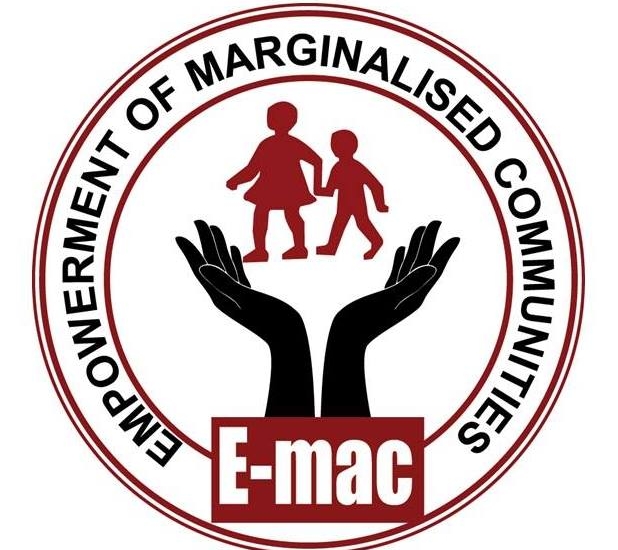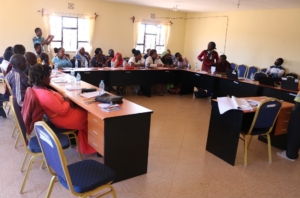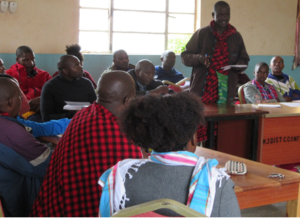Project
Towards ending FGM!
-
Amount Funded
24,759 EUROProject Duration
01 Aug 2018 - 20 Jun 2020 -
-
Lead organisation
-
Empowerment of Marginalized Communities (EMAC) is a Non – Governmental Organization (NGO) established in 2010 as a CBO. It was officially registered in April 2013. The goal of EMAC is to see a society where all the marginalised and vulnerable women and men are free from poverty, health disorders and diseases like HIV and AIDS; have equal opportunities and access to resources for development and participate fully in poverty eradication and decision-making processes. It is committed to improve justice and equality among vulnerable groups.
EMAC focuses in three thematic areas of Livelihood, environmental conservation, and health. It is a grass root organisation working with communities to identify critical issues affecting them and jointly propose sustainable solutions through locally available resources before seeking external support. EMAC is working through the formation of groups, training them in entrepreneurship skills i.e. beekeeping and tree planting and linking them with potential sources of markets to sell their produce.
-
Organisation
Empowerment of Marginalized Communities (EMAC) is a Non – Governmental Organization (NGO) established in 2010 as a CBO. It was officially registered in April 2013. The goal of EMAC is to see a society where all the marginalised and vulnerable women and men are free from poverty, health disorders and diseases like HIV and AIDS; have equal opportunities and access to resources for development and participate fully in poverty eradication and decision-making processes. It is committed to improve justice and equality among vulnerable groups.
EMAC focuses in three thematic areas of Livelihood, environmental conservation, and health. It is a grass root organisation working with communities to identify critical issues affecting them and jointly propose sustainable solutions through locally available resources before seeking external support. EMAC is working through the formation of groups, training them in entrepreneurship skills i.e. beekeeping and tree planting and linking them with potential sources of markets to sell their produce.
-
Project
Female genital cutting (FGC) is prohibited by law in Tanzania. Nevertheless, it is still part of a rite of passage from childhood to womanhood among nomadic communities in Tanzania including Simanjiro district. Towards ending FGM project works with community elders, religious leaders, and other stakeholders to provide an Alternative Rite of Passage (ARP). This is done by maintaining the lessons and eliminating the procedure through awareness creation, peer to peer education, sensitisation meeting among men and women, awareness meetings with religious and community leaders about the deadly effects of FGC to girls.
In addition, the project addresses the effects of early marriages which are associated with the cutting and encourage Morans/young men to be ready to get married to uncircumcised girls. The primary target of this project is girls aged 7 to 24 and 15 to 48 women of reproductive age while the secondary target is religious leaders, community leaders, Morans, Traditional Birth Attendants (TBAs) and government officials from social welfare department.
-
-
Female genital cutting (FGC) is prohibited by law in Tanzania. Nevertheless, it is still part of a rite of passage from childhood to womanhood among nomadic communities in Tanzania including Simanjiro district. Towards ending FGM project works with community elders, religious leaders, and other stakeholders to provide an Alternative Rite of Passage (ARP). This is done by maintaining the lessons and eliminating the procedure through awareness creation, peer to peer education, sensitisation meeting among men and women, awareness meetings with religious and community leaders about the deadly effects of FGC to girls.
In addition, the project addresses the effects of early marriages which are associated with the cutting and encourage Morans/young men to be ready to get married to uncircumcised girls. The primary target of this project is girls aged 7 to 24 and 15 to 48 women of reproductive age while the secondary target is religious leaders, community leaders, Morans, Traditional Birth Attendants (TBAs) and government officials from social welfare department.
-
Empowerment of Marginalised Communities (E-MAC) trained 20 female peer educators aged between 14-19 to reach out and teach their peer who is considered a child, children’s rights, sexual and reproductive health information, and Female Genital Mutilation (FGM) and its effects. Furthermore, E-MAC trained 40 community and religious leaders such as Laigwanan (Maasai community leaders), Community Development Officers (CDO), District Social Welfare Officers (DSWO) and Village Executive Officers (VEOs). The training was also given to Ward Executive Officers (WEOs), Community Health Workers (CHWs), Religious leaders, village officers, and Traditional Birth Attendants on the effects of FGM, and an Alternative Rite of Passage (ARPs) ceremony was adopted in place of FGM.

Community leader sharing experience with other leaders on how secretly FGM practices are conducted and measures that she takes as a leader in her community. Group discussion and sharing during training of community and religious leaders. In a separate training session, 20 Traditional Birth Attendants (TBAs) who practice FGM as a source of income were taught the harmful effects of FGM and trained to abandon practices that could harm people’s health. They were also taught entrepreneurship skills to provide them with an alternative source of income.
E-MAC also trained 50 Morans (young Maasai men typically between the ages of 16-30) on the effects of FGM on girls and women. These young men are socialised to marry women who are circumcised as part of their customs and traditions. The E-MAC team trained them on the effects of FGM and that sex was better with uncircumcised women. After the training, young men were ready to support the fight against FGM, and they were persuaded to marry uncircumcised women. The young men were also willing to raise awareness within their communities.

Stakeholders discuss the challenges they are facing in their villages and how to overcome them. E-MAC also worked with ten local officials at the Gender-Based Violence-Police desk, training them on the effects of FGM early pregnancy and reviewing existing laws. The desk works to ensure that girls are kept safe from parents and relatives who want them circumcised. In addition, E-MAC worked with officials in implementing strategies to ensure community members share information about individuals violating young girls’ rights.
E-MAC has secured more funding from the Associated Country Women of the World (ACWW) to support their fight against FGM in the Simanjiro District. The funds will go towards expanding the project in another ward with three villages; the main aim is to create awareness of the effects of FGM in the Simanjiro District and introduce Alternative Rites of Passage ceremonies in place of FGM.





